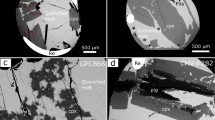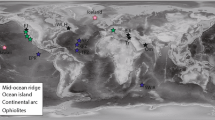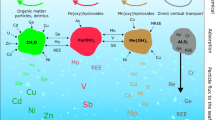Abstract
Significant boron isotope fractionation occurs in nature (−70 ‰ to +75 ‰) due to the high geochemical reactivity of boron and the large relative mass difference between 10B and 11B. Since the 1990s, reconstruction of ancient seawater pH using the isotopic composition of boron in bio-carbonates (δ 11Bcarb), and then calculation of the past pCO2 have become important issues for the international isotope geochemistry community, and are called the δ 11B-pH proxy. Although many achievements have been made by this proxy, various aspects of boron systematics require rigorous evaluation. Based on the previous researches, mechanism of boron isotope fractionation, variation of boron isotope (δ 11B) in nature (especially in bio-carbonates) and controlling factors of the δ 11B-pH proxy, such as the dissociation constant of B(OH)3 in seawater (pKa), the δ 11B of seawater (δ 11BSW), the boron isotopic fractionation factor between B(OH) −4 and B(OH)3 (α 4–3), and the incorporated species of boron into bio-carbonates, are reviewed in detail and the research directions of this proxy are proposed. Generally, the controversy about pKa, δ 11Bsw, and α 4–3 is relatively less, but whether boron incorporated into bio-carbonates only in the form of B(OH) −4 remains doubtful. In the future, it is required that the physicochemical processes that control boron incorporation into carbonates be rigorously characterized and that the related chemical and isotopic fractionation be quantified. It is also necessary and important to establish a “best-fit empirically equation” between δ 11Bcarb and pH of seawater based on the precipitation experiments of inorganic or culture experiments of corals or foraminifera. In addition, extended application of the δ 11B-pH proxy to the earlier part of the Phanerozoic relying on the Brachiopods is worthy of studying. Like other geochemical indicators, there are limiting factors of δ 11B; however, it remains a very powerful tool in the reconstruction of past seawater pH at present.



Similar content being viewed by others
References
Barth SR (1993) Boron isotope variations in nature: a synthesis. Geol Rundsch 82:640–651
Barth SR (1998) Application of boron isotopes for tracing source of anthropogenic contamination in groundwater. Water Res 32(3):685–690
Barth SR (2000) Stable isotope geochemistry of sediment-hosted groundwater from a Imte Paleozoie-Early Mesozoic section in central Europe. J Hydrol 235:72–87
Bassett RL (1990) A critical evaluation of the available measurements for the stable isotopes of boron. Appl Geochem 5:541–554
Byrne RH, Yao W, Klochko K, Tossell JA, Kaufman AJ (2006) Experimental evaluation of the isotopic exchange equilibrium 10B(OH)3 + 11B(OH) −4 =11B(OH)3 + 10B(OH) −4 in aqueous solution. Deep-Sea Res 153:684–688
Chaussidon M, Albaréde F (1992) Secular boron isotopic variations in the continental crust: an ion microprobe study. Earth Planet Sci Lett 108:229–241
Chaussidon M, Jambon A (1993) Boron content and isotopic composition of oceanic basalts: geochemical and cosmochemical implications. Earth Planet Sci Lett 121:277–291
Chetelat B, Gaillardet J, Freydier R (2009a) Use of B isotopes as a tracer of anthropogenic emissions in the atmosphere of Paris, France. Appl Geochem 24:810–820
Chetelat B, Liu CQ, Gaillardet J, Wang QL, Zhao ZQ, Liang CS, Xiao YK (2009b) Boron isotopes geochemistry of the Changjiang Basin Rivers. Geochim Cosmochim Acta 73:6084–6097
Cividini D, Lemarchand D, Chabaux F, Boutin R, Pierret MC (2010) From biogenical to lithogenical control of the B geochemical cycle in a forested watershed (Strengbach, Vosges). Geochim Cosmochim Acta 74:3143–3163
Dickson A (1990) Thermodynamics of dissociation of boric acid in synthetic seawater from 273.15 to 318.15 K. Deep-Sea Res 37:755–766
Foster GL, Pogge von Strandmann PAE, Rae JWB (2010) Boron and magnesium isotopic composition of seawater. Geochem Geophy Geosy 11:Q08015. doi:10.1029/2010GC003201
Gaillardet J, Allègre CJ (1995) Boron isotopic compositions of corals: seawater or diagenesis record? Earth Planet Sci Lett 136:665–676
He MY, Xiao YK, Jin ZD, Liu WG, Ma YQ, Zhang YL, Luo CG (2013) Quantification of boron incorporation into synthetic calcite under controlled pH and temperature conditions using a differential solubility technique. Chem Geol 337–338:67–74
Hemming NG, Hanson GN (1992) Boron isotopic composition and concentration in modern marine carbonates. Geochim Cosmochim Acta 56:537–543
Hemming NG, Reeder RJ, Hanson GN (1995) Mineral-fluid partitioning and isotopic fractionation of boron in synthetic calcium carbonate. Geochim Cosmochim Acta 59:371–379
Hershey JP, Fernandez M, Milne PJ, Millero FJ (1986) The ionization of boric acid in NaCl, Na-Ca-Cl, and Na-Mg-Cl solutions at 25 °C. Geochim Cosmochim Acta 50:143–148
Hogan JF, Blum JD (2003) Boron and lithium isotopes as groundwater tracers: a study at the Fresh Kills Landfill, Staten Island, New York, USA. Appl Geochem 18:615–627
Hönisch B, Hemming NG, Loosed B (2007) Comment on “A critical evaluation of the boron isotope-pH proxy: the accuracy of ancient ocean pH estimates” by M. Pagani, D. Lemarchand, A. Spivack and J. Gaillardet. Geochim Cosmochim Acta 71:1636–1641
Inghram MG (1946) Isotopic constitution of tungstene, silicon and boron. Phys Rev 70:653–660
Ishikawa T, Nakamura E (1993) Boron isotope systematics of marine sediments. Earth Planet Sci Lett 117:567–580
Joachimski MM, Slmon L, Gelden RV (2005) Boron isotope geochemistry of Paleozoic brachiopod calcite: implications for a secular change in the boron isotope geochemistry of seawater over the Phanerozoic. Geochim Cosmochim Acta 69(16):4035–4044
Kakihana H, Kotaka M, Satoh S, Nomura M, Okamoto M (1977) Fundamental studies on the ion-exchange separation of boron isotopes. Bull Chem Soc Jpn 50:158–163
Klochko K, Kaufman A, Yao W, Byrne R, Tossell J (2006) Experimental measurements of boron isotope fractionation in seawater. Earth Planet Sci Lett 248:261–270
Klochko K, Cody GD, Tossell JA, Dera P, Kaufman AJ (2009) Re-evaluating boron speciation in biogenic calcite and aragonite using 11B MAS NMR. Geochim Cosmochim Acta 73:1890–1900
Kopf A, Deyhle A (2002) Back to the roots: boron geochemistry of mud volcanoes and its implications for mobilization depth and global B cycling. Chem Geol 192(3/4):195–210
Lécuyer C, Grandjean P, Reynard B, Albarède F, Telouk P (2002) 11B/10B analysis of geological materials by ICP-MS Plasma 54: application to the boron fractionation between brachiopod calcite and seawater. Chem Geol 186:45–55
Lemarchand D, Gaillardet J, Lewin É, Allègre CJ (2000) The influence of rivers on marine boron isotopes and implications for reconstructing past ocean pH. Nature 408:951–954
Lemarchand D, Gaillardet J, Lewin É, Allègre CJ (2002) Boron isotope systematics in large rivers: implications for the marine boron budget and paleo-pH reconstruction over the Cenozoic. Chem Geol 190:123–140
Li HL, Xiao YK, Wei HZ, Du XY, Wang XF, Chen YF (2006) Primary study for trace element and isotopic compositions of boron in growing corals from Sanya Bay, China. J Salt Lake Res 14:35–41 (in Chinese with English abstract)
Liu Y, Tossell JA (2005) Ab initio molecular orbital calculations for boron isotope fractionations on borinc acids and borates. Geochim Cosmochim Acta 69:3995–4006
Mather JD, Porteous NC (2001) The geochemistry of boron and its isotopes in groundwaters from marine and non-marine sandstone aquifers. Appl Geochem 16:821–834
Musachi M, Oi T, Ossaka T, Kakihana H (1991) Natural boron isotope fractionation between hot spring water and rock in direct contact. Isotopenraxis 27:163–166
Oi T (2000) Ab initio orbital calculations of reduced partition function ratios of polyboric acids and borate anions. Naturforsch 55:623–628
Oi T, Tsukamoto K, Akai H, Kahihana H, Hosoe M (1988) Boron isotope separation by ion-exchange chromatiography using an anion-exchange resin in halide forms: separation factors at 25 °C. J Chromatogr 450(3):343–352
Oi T, Nomura M, Musashi M, Ossaka T, Okamoto M, Kakihana H (1989) Boron isotopic compositions of some boron minerals. Geochim Cosmochim Acta 53:3189–3319
Pagani M, Spivack A (2007) Response to the Comment by B. Hönisch, N.G. Hemming, B. Loose on “A critical evaluation of the boron isotope-pH proxy: the accuracy of ancient ocean pH estimates”. Geochim Cosmochim Acta 71:1642
Pagani M, Lamarchand D, Spivack A, Gaillardet J (2005) A critical evaluation of the boron isotope-pH proxy: the accuracy of ancient ocean pH estimates. Geochim Cosmochim Acta 69:953–961
Palmer MR, Sturchio NC (1990) The boron isotope systematics of the Yellowstone National Park (Wyoming) hydrothermal system: a reconnaissance. Geochim Cosmochim Acta 54:2319–2323
Palmer MR, Swihart GH (1996) Boron isotope geochemistry: an overview. Rev in Mineral Geochem 33:709–744
Palmer MR, Spivack AJ, Edmond JM (1987) Temperature and pH controls over isotopic fractionation during absorption of boron marine clay. Geochim Cosmochim Acta 51:2319–2323
Palmer MR, London D, Morgan GB, Babb HA (1992) Experimental determination of fractionation of 11B/10B between tourmaline and aqueous vapour: a temperature and pressure dependent isotopic system. Chem Geol 101:123–129
Peacock SM, Hervig RL (1999) Boron isotopic composition of subduction-zone metamorphic rocks. Chem Geol 160:281–290
Pearson PN, Palmer MR (1999) Middle Eocene seawater pH and atmospheric carbon dioxide concentration. Science 284:1824–1826
Pearson PN, Palmer MR (2000) Atmospheric carbon dioxide concentrations over the past 60 million years. Nature 406:695–699
Pennisi M, Leeman WP, Tonarini S, Pennisi A, Nabelek P (2000) Boron, Sr, O, and H isotope geochemistry of groundwaters from Mt. Etna (Sicily)-hydrologic implications. Geochimica et Cosmchimica Acta 64(6):961–974
Rollion-bard C, Erez J (2010) Intra-shell boron isotope ratios in the symbiont-bearing benthic foraminiferan Amphistegina lobifera: implications for δ 11B vital effects and paleo-pH reconstructions. Geochim Cosmochim Acta 74:1530–1536
Rollion-bard C, Blamart D, Trebosc J, Tricot G, Mussia A, Cuif JP (2011) Boron isotopes as pH proxy: a new look at boron speciation in deep-sea corals using 11B MAS NMR and EELS. Geochim Cosmochim Acta 75:1003–1012
Rose EF, Chausidon M, France-Lanord C (2000) Fractionation of boron isotopes during erosion processes: the example of Himalayan rivers. Geochim Cosmochim Acta 64(3):397–408
Rose-Koga EF, Sheppard SMF, Chaussidon M, Carignan J (2006) Boron isotopic composition of atmospheric precipitations and liquid-vapour fractionations. Geochim Cosmochim Acta 70:1603–1615
Roy RN, Roy LN, Vogel KM, Porter-Moore C, Pearson T, Good CE, Millero FJ, Campbell DM (1993) Thermodynamics of the dissociation of boric acid in seawater at salinities 5 to 45 and temperatures 0 to 45 °C. Mar Chem 44:249–267
Sanyal A, Hemming NG, Hanson GN, Broecker WS (1995) Evidence for a high pH in the glacial ocean from boron isotopes in foraminifera. Nature 373:234–236
Sanyal A, Hemming NG, Broecker WS, Lea DW, Spero HJ, Hanson GN (1996) Oceanic pH control on the boron isotopic composition of foraminifera: evidence from culture experiments. Paleoceanography 11(5):513–517
Sanyal A, Nugent M, Reeder RJ, Bijma J (2000) Seawater pH control on the boron isotopic composition of calcite: evidence from inorganic calcite precipitation experiments. Geochim Cosmochim Acta 64:1551–1555
Schmitt A, Vigier N, Lemarchand D, Millot R, Stille P, Chabaux F (2012) Processes controlling the stable isotope compositions of Li, B, Mg and Ca in plants, soils and waters: a review. CR Geosci 344:704–722
Simon L, Lécuyer C, Maréchal C, Coltice N (2006) Modelling the geochemical cycle of boron: implications for the long-term δ11B evolution of seawater and oceanic crust. Chem Geol 225(1/2):61–67
Spivack AJ, Edmond JM (1986) Determination of boron isotopic ratios by thermal ionization mass spectrometry of the dicesium metaborate cation. Anal Chem 58:31–35
Spivack AJ, Edmond JM (1987) Boron isotope exchange between seawater and the oceanic crust. Geochim Cosmochim Acta 51:1033–1043
Spivack AJ, Palmer MR, Edmond JM (1987) The sedimentary cycle of the boron isotopes. Geochim Cosmochim Acta 51:1939–1949
Spivack AJ, You CF, Smith J (1993) Foraminiferal boron isotopic ratios as a proxy for surface ocean pH over the past 21 Myr. Nature 363:149–151
Su C, Suarez DL (1995) Coordination of adsorbed boron: a FTIR spectroscopic study. Environ Sci Technol 29:302–311
Swihart GH, Moore PB, Callis EL (1986) Boron isotopic composition of marine and nonmarine evaporite borates. Geochim Cosmochim Acta 50:1297–1301
Taylor SR, Mclennan SM (1985) The continental crust: its composition and evolution. Blackwell Scientific Publication, Oxford
Urey HC (1947) The thermodynamic properties of isotopic substances. J Chem Soc 57:562–581
Vengosh A, Chivas AR, MuCulloch MT, Starinsky A, Kolodny Y (1991a) Boron isotope geochemistry of Australian salt lakes. Geochim Cosmochim Acta 55:2591–2606
Vengosh A, Kolodny Y, Starinsky A, Chivas AR, McCuloch MT (1991b) Coprecipitation and isotopic fractionation of boron in modern biogenic carbonates. Geochim Cosmochim Acta 55:2901–2910
Vengosh A, Starinsky A, Kolodny Y, Chivas AR (1991c) Boron isotope geochemistry as a tracer for the evolution of brines and associated hot springs from the Dead Sea, Israel. Geochimica et Cosomchimica Acta 55(6):1689–1695
Vengosh A, Starinsky A, Kolodny Y, Chivas AR, Raab M (1992) Boron isotope variation during fractional evaporation of seawater: new constraints on the marine vs non-marine debate. Geology 20:799–802
Vengosh A, Heumann KG, Juraske S, Kasher R (1994) Boron isotope application for tracing sources of contamination in groundwater. Environ Sci Technol 28(11):1968–1974
Wieser ME, Iyer SS, Krouse HR, Cantagallo MI (2001) Variations in the boron isotope composition of Coffea arabica beans. Appl Geochem 16:317–322
Williams LB, Hervig RL (2004) Boron isotope composition of coals: a potential tracer of organic contaminated fluids. Appl Geochem 19:1625–1636
Williams LB, Hervig RL, Wieser ME, Hutcheon I (2001) The influence of organic matter on the boron isotope geochemistry of the gulf coast sedimentary basin, USA. Chem Geol 174:445–461
Xiao YK, Wang L (2001) The effect of pH and temperature on the isotopic fractionation of boron between saline brine and sediments. Chem Geol 171:253–261
Xiao YK, Beary ES, Fassett JD (1988) An improved method for the high precision isotopic measurement of boron by thermal ionization mass spectrometry. Int J Mass Spectrom Ion Processes 85:203–213
Xiao YK, Sun DP, Wang YH, Jin L (1992) Boron isotopic compositions of brine, sediments, and source water in Da Qaidam, China. Geochim Cosmochim Acta 56:1561–1568
Xiao YK, Li SZ, Wei HZ, Sun AD, Zhou WJ, Liu WG (2006) An unusual isotopic fractionation of boron in synthetic calcium carbonate precipitated from seawater and saline water. Sci China, Ser B 49:454–465
Xiao YK, Li HL, Liu WG, Wang XF, Jiang SY (2008) Boron isotopic fractionation in laboratory inorganic carbonate precipitation: evidence for the incorporation of B(OH)3 into carbonate. Sci China Ser D 51:1776–1785
Xiao J, Xiao YK, Liu CQ, Jin ZD (2011) Boron isotope fractionation during brucite deposition from artificial seawater. Clim Past 7:693–706
Xiao J, Xiao YK, Jin ZD, Liu CQ, He MY (2013) Boron isotopic compositions in growing corals from the South China Sea. J Asian Earth Sci 62:561–567
Yu JM, Elederfield H, Hönishch B (2007) B/Ca in planktonic foraminifera as a proxy for surface seawater pH. Paleoceanography 22:PA2202. doi:10.1029/2006PA001347
Yu JM, Foster GL, Elederfield H, Broecker WS, Clark E (2010) An evaluation of benthic foraminiferal B/Ca and δ11B for deep ocean carbonate ion and pH reconstructions. Earth Planet Sci Lett 293:114–120
Zeebe RE (2005) Stable boron isotope fractionation between dissolved B(OH)3 and B(OH) −4 . Geochim Cosmochim Acta 69(11):2753–2766
Zhao ZQ, Liu CQ (2010) Anthropogenic inputs of boron into urban atmosphere: evidence from boron isotopes of precipitations in Guiyang city, China. Atmos Environ 44(34):4165–4171
Zhao ZQ, Liu CQ, Xiao YK, Lang YC (2003) Geochemical study of boron isotopes in the process of loess weathering. Sci China Ser D 46:106–116
Acknowledgments
This work was financially supported by National Science Foundation of China through grants 41003012, 41103008, “Western Doctor” of the West Light Foundation of Chinese Academy of Sciences and the Key Research Program of the Chinese Academy of Sciences (Grant KZZD-EW-04-02).
Author information
Authors and Affiliations
Corresponding author
Rights and permissions
About this article
Cite this article
Xiao, J., Jin, Z.D., Xiao, Y.K. et al. Controlling factors of the δ 11B-pH proxy and its research direction. Environ Earth Sci 71, 1641–1650 (2014). https://doi.org/10.1007/s12665-013-2568-8
Received:
Accepted:
Published:
Issue Date:
DOI: https://doi.org/10.1007/s12665-013-2568-8




